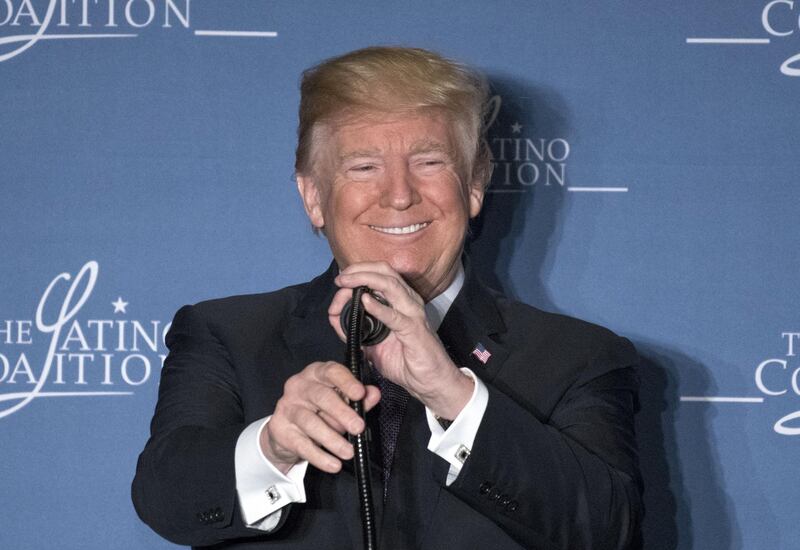US President Donald Trump plans to offer Canada and Mexico a 30-day exemption from planned tariffs on steel and aluminium imports, which could be extended based on progress in Nafta talks, a White House official said on Wednesday night.
The move, first reported by The Washington Post, followed comments earlier in the day by a White House spokeswoman that the impending tariffs could exclude Canada, Mexico and a clutch of other countries "based on national security."
Mr Trump was expected to sign a presidential proclamation to establish the tariffs during a ceremony on Thursday, but a White House official said later it could slide into Friday because documents had to be cleared through a legal process.
The president has faced mounting opposition to the tariffs from prominent congressional Republicans and business officials worried about their potential impact on the economy.
The tariffs would impose duties of 25 per cent on steel and 10 per cent on aluminium to counter cheap imports, especially from China, that the president says undermine US industry and jobs.
A senior US official said the measures would take effect about two weeks after Mr Trump signs the proclamation.
White House spokeswoman Sarah Sanders told a regular media briefing on Wednesday: “We expect that the president will sign something by the end of the week and there are potential carve-outs for Mexico and Canada based on national security, and possibly other countries as well based on that process.
“It will be country by country, and it will be based on national security,” she said.
Mr Trump had said on Monday that Canada and Mexico would only be excluded after the successful renegotiation of the North American Free Trade Agreement (Nafta). Efforts by Mr Trump and US trade negotiators to link the Nafta talks to the duties have received short shrift from Ottawa and Mexico City.
______________
Read more:
With Trump's transactional approach, celebrate victories and mourn defeats
IMF's Lagarde says US import tariffs may hit global growth
______________
Action that does not include exemptions risks retaliatory tariffs on US exports - not least by Canada and Europe - and complicates already tough trade talks on Nafta.
The benchmark Standard & Poor’s 500 stock index ended slightly lower following a volatile session after Mr Trump promised the tariffs but then said Mexico and Canada could be exempt.
The S&P closed 0.05 per cent lower after being down 0.4 per cent, while the Dow Jones Industrial Average ended down 0.33 per cent. The US dollar pared gains to end little changed, while the Canadian dollar and Mexican peso pared some losses.
Markets were rattled by Tuesday’s resignation announcement by Mr Trump’s chief economic adviser, Gary Cohn, who was seen as a bulwark against his economic nationalism.
Cohn’s departure, after an internal White House battle over Mr Trump’s plans to impose the tariffs, clears the way for greater influence by trade hardliners such as Commerce Secretary Wilbur Ross and Peter Navarro, his trade policy adviser.
Mr Sanders said Mr Trump was considering several candidates to fill Mr Cohn’s position, while Mr Navarro said he was not short-listed for the job.
In his first tweet on Wednesday, the Republican president showed no sign of backing away from the tariffs, saying the United States had lost more than 55,000 factories and 6 million manufacturing jobs and let its trade deficit soar since the 1989-1993 administration of President George W Bush.
Later, his tweets turned to trade with China, demanding that Beijing lay out plans for reducing its trade surplus with the United States by $1 billion, which appeared to have been raised during a meeting with a top Chinese official last week.
“China has been asked to develop a plan for the year of a One Billion Dollar reduction in their massive Trade Deficit with the United States,” Nr Trump tweeted, without saying where the message had been conveyed.
China ran a record goods trade surplus with the United States last year of $375.2bn. On Wednesday, more than 100 House of Representative Republicans, including Kevin Brady, chairman of the House Ways and Means Committee that oversees US trade policy, wrote to Mr Trump praising him for standing up to “bad actors,” but emphasised that fairly traded products should be excluded from the tariffs.
In a separate letter, Iowa’s congressional delegation, including two Republican senators, warned that the tariffs would hurt the state’s farmers and manufacturing.
The head of the influential US Chamber of Commerce, Tom Donohue, warned about the impact to the economy.
“We won’t drive the economy to over 3 per cent growth or continue to create jobs if we go down this path,” said Mr Donohue, the chamber’s president and chief executive. “We urge the administration to take this risk seriously.”





